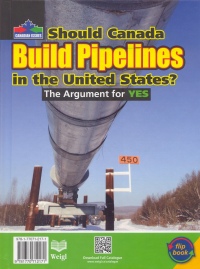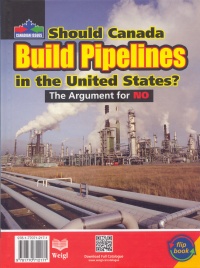| ________________
CM . . . . Volume XIX Number 20 . . . . January 25, 2013
excerpt:
Should Canada Build Pipelines in the United States?, a volume in Weigl's "Canadian Issues" series, is intended to present straightforward information for both the "Yes" and "No" debate sides of the Keystone XL pipelines issue. The flip book format is used to give readers a double-page spread for the background, position, arguments, statistics, players, and a potential outcome on each side. As well, both sides are supplemented with an additional opening page and activities. The "Yes" argument begins with a discussion of the demand for oil, followed by a discussion of the stability of Canada as a source, as well as the positive relationship between Canada and the United States and the benefits of job creation. Impacts of creating the pipeline are also mentioned. Downsides in the "No" argument include environmental risks. Readers will find historical data, pictures of existing pipelines, previous oil spills, an argument for alternate sources of energy, and the impact of rejecting the pipeline. Readers may find information, such as the names of environmentalists or Canada's Minister of Natural Resources, helpful in preparing reports or debates. When creating a book largely intended for students, a downside to the flip book format is the lack of any further resources or citations for any of the included information. Should Canada Build Pipelines in the United States? is a supplemental purchase for classrooms and libraries looking for material on environmental issues or classroom reports. Recommended with reservations. Elizabeth Fraser is a librarian with the Calgary Public Library and the author of Reality Rules II: A Guide to Nonfiction Reading Interests (Libraries Unlimited, 2012).
To comment
on this title or this review, send mail to cm@umanitoba.ca.
Copyright © the Manitoba Library Association. Reproduction for personal
use is permitted only if this copyright notice is maintained. Any
other reproduction is prohibited without permission.
NEXT REVIEW |
TABLE OF CONTENTS FOR THIS ISSUE
- January 25, 2013.
AUTHORS |
TITLES |
MEDIA REVIEWS |
PROFILES |
BACK ISSUES |
SEARCH |
CMARCHIVE |
HOME |

